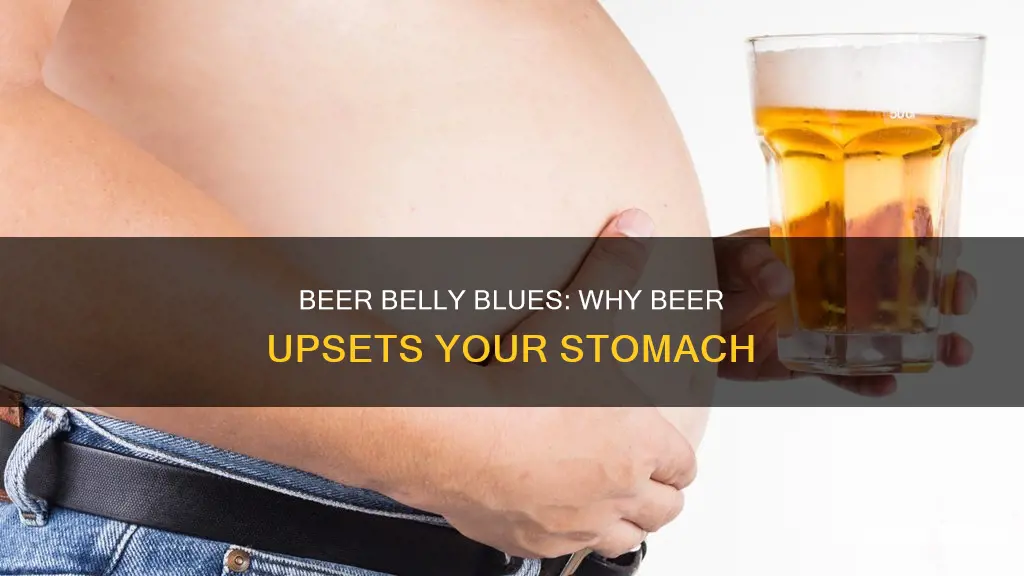
Beer is a popular alcoholic beverage, but it can cause some people to experience an upset stomach. While moderate consumption may not cause issues for most, beer has the potential to irritate the stomach or trigger or worsen pre-existing conditions. In some cases, beer may even be the cause of more serious health issues.
| Characteristics | Values |
|---|---|
| Stomach irritation | Beer can irritate the gut, including the stomach. |
| Acid reflux | Beer can cause acid reflux, which can lead to irritation and pain. |
| Ulcers | Beer can interfere with ulcer healing and worsen existing stomach damage. |
| Liver disease | Heavy alcohol consumption can lead to liver disease. |
| Pancreatitis | Heavy drinking can cause pancreatitis, a potentially life-threatening inflammation of the pancreas. |
| Diarrhea | Alcohol can speed up metabolism and cause diarrhea. |
| Bloating | Carbonation in beer can lead to bloating. |
| Heartburn | Beer is associated with heartburn. |
| Gastritis | Alcohol can cause gastritis, an inflammation of the stomach lining. |
What You'll Learn

Beer and acid reflux
Beer can cause acid reflux, which occurs when the acidic contents of the stomach escape upward into the oesophagus, causing a painful, burning sensation. Beer's carbonation can lead to bloating and belching, which makes it more likely for stomach acid to travel up into the oesophagus, causing irritation and pain.
The maleic and succinic acid in beer increase stomach acid secretion, which can aggravate acid reflux. Additionally, alcohol slows down stomach emptying, making regurgitation of stomach contents more likely.
If you experience acid reflux or heartburn after drinking beer, it is advisable to reduce your consumption or switch to non-carbonated or gluten-free drinks. You can also try over-the-counter medications such as antacids or acid-blocking medications to alleviate symptoms.
To prevent acid reflux, it is recommended to follow a low-risk drinking guideline, such as not consuming more than 14 units of alcohol per week, having several drink-free days, and avoiding binge drinking.
In addition to acid reflux, excessive alcohol consumption can lead to other gastrointestinal issues such as gastritis, peptic ulcers, and inflammation in the gut. It is important to be mindful of your body's reactions and adjust your consumption or seek medical advice if necessary.
Beer and Bones: Strengthening the Skeletal System
You may want to see also

Beer and bloating
Bloating is a common problem for beer drinkers. Carbonated drinks, such as beer, have the ability to cause bloating. Beer's carbonation could lead to bloating and belching, which makes it more likely for stomach acid to travel up into the oesophagus, causing irritation and pain.
If you are experiencing bloating after drinking beer, it could be a sign that your body cannot tolerate beer, or certain ingredients in it. You might be allergic to beer, or you might have a sensitivity to it. Nutritional counsellor and advanced practitioner Elizabeth Trattner, A.P., L.Ac., N.C.C.A.O.M, suggests that one way to find out if your body can tolerate beer is if you immediately bloat and feel like you need to undo your pants after drinking it. If this is the case, it may be time to investigate whether you should give up beer and try something else.
You may be able to consume grains, hops, and yeast in other forms, such as bread, but once these ingredients are brewed and consumed as alcohol, properties change and so can your reaction. You don't have to have a specific allergy to an ingredient in beer to be sensitive to beer itself.
If you are experiencing extreme bloating, discomfort, or an upset stomach, these could be warning signs that you have a beer allergy. However, there are many other symptoms that can present themselves in the case of an intolerance.
If you are unsure if it is beer that is causing these reactions, try avoiding alcohol, switching to gluten-free drinks like cider or wine, or try a gluten-free beer. If the symptoms still persist, your doctor can help you figure out if it is an intolerance, an allergy, or something else. According to the Mayo Clinic, blood tests can help to accurately pinpoint what's going on in your body and see if you're producing allergy antibodies when beer is in your system.
If you are experiencing stomach pain or nausea, or are vomiting, it's important to stop drinking and seek medical attention if the symptoms persist or worsen.
Beer Ounces: Defining a Standard Drink
You may want to see also

Beer and inflammation
Drinking beer can cause inflammation in the gut, and consistent drinking can increase the risk of liver disease. Beer passes through the body very quickly, which can lead to increased irritation in the intestines. Beer, like other alcoholic drinks, can also cause acid reflux, where acid from the stomach escapes up into the oesophagus, causing irritation and a painful burning sensation. Beer's carbonation can lead to bloating and belching, which makes it more likely for stomach acid to travel up into the oesophagus. Alcohol also increases stomach acid secretion, which can further aggravate acid reflux.
In addition, heavy drinking can cause gastritis, an inflammation of the stomach lining, which can be acute or chronic. Acute gastritis is an immediate inflammation of the stomach lining, which can be very painful and cause severe stomach cramping, irritability, and vomiting. Chronic gastritis is a long-term condition where the stomach lining remains inflamed and is worn down over time. Those who consume alcohol regularly may only experience minor symptoms for an extended period due to decreased sensitivity from continued alcohol use. Symptoms of gastritis include feeling uncomfortably full after eating, indigestion, a gnawing or burning stomach pain, feeling sick, and vomiting.
If you are experiencing inflammation, it is important to call your doctor.
Growler of Beer: Can You Drink It?
You may want to see also

Beer and liver disease
Beer and other alcoholic drinks can irritate the gut, including the stomach. Beer can also cause acid reflux and heartburn. In addition, the carbonation in beer can lead to bloating and belching, which can cause stomach acid to travel up into the oesophagus, resulting in irritation and pain.
Excessive alcohol consumption can lead to liver disease. Alcohol-associated liver disease is common but preventable. It is caused by heavy alcohol use and is potentially fatal. The liver's job is to break down alcohol, but if you drink more than it can process, it can become badly damaged.
There are three types of alcohol-associated liver disease:
- Steatotic (fatty) liver: This is the most common alcohol-induced liver problem. It is caused by a build-up of fat inside the liver cells, which leads to an enlarged liver.
- Acute hepatitis: Alcohol-associated hepatitis is an acute inflammation of the liver that can lead to permanent scarring.
- Cirrhosis: Alcohol-associated cirrhosis is the destruction of normal liver tissue, which is replaced by scar tissue. This can cause the liver to stop working correctly.
The early stages of alcohol-related liver disease often have no symptoms, but when they are present, they may include pain or discomfort in the upper right side of the abdomen, fatigue, or unexplained weight loss. If you are experiencing abdominal pain related to drinking beer, this could be a sign of liver disease or damage to other abdominal organs.
If you suspect you have an intolerance to beer or are experiencing any negative side effects from drinking it, it is best to consult a doctor or healthcare provider, who can advise you on the best course of action.
Carmel Beach Drinking Laws: Beer and Beyond
You may want to see also

Beer and gastritis
Beer and other alcoholic drinks can upset your stomach and cause abdominal pain, nausea and vomiting. This is because beer has the potential to irritate your stomach and trigger or worsen a preexisting condition. One such condition is gastritis, which is an inflammation and irritation of the stomach lining.
Alcoholic gastritis is caused by drinking too much, too often. The alcohol irritates and erodes the stomach lining, triggering gastritis symptoms. These symptoms include a gnawing, burning ache in the stomach, a constant pain between the navel and ribs, belching and hiccupping, and a bloated or full feeling in the stomach that worsens after eating. If left untreated, gastritis can lead to serious problems such as anemia, peptic ulcers, gastric polyps, and stomach tumours that may or may not be cancerous.
If you have gastritis, it is best to avoid alcohol or drink it in moderation. However, this may be easier said than done if you have an alcohol addiction. The most effective way to treat alcoholic gastritis is to limit or stop alcohol consumption. Other treatments for gastritis include medication such as antibiotics, antacids, histamine (H2) blockers, and proton pump inhibitors. Doctors may also recommend dietary changes such as avoiding spicy foods and acidic beverages, as well as quitting smoking.
To sum up, beer and other alcoholic drinks can irritate the stomach and trigger or worsen conditions like gastritis, which is an inflammation of the stomach lining. Alcoholic gastritis can lead to serious health problems if left untreated, so it is important to seek medical advice and make the necessary lifestyle changes.
Drinking and Driving: How Many Beers Are Too Many?
You may want to see also
Frequently asked questions
Beer can upset your stomach in several ways. Beer is carbonated, which can lead to bloating and belching, making it more likely for stomach acid to travel up into the oesophagus and cause irritation and pain. Beer also increases stomach acid secretion, which can aggravate acid reflux. In addition, alcohol slows down stomach emptying, making regurgitation of stomach contents more likely.
Symptoms of an upset stomach caused by beer can include extreme bloating, discomfort, mild upper abdominal pain, nausea, and vomiting. More serious symptoms can include swollen lymph nodes, a stuffy nose, headaches, skin rashes, and swollen, irritated eyes.
To prevent an upset stomach when drinking beer, it is recommended to follow low-risk drinking guidelines, such as not drinking more than 14 units a week, having several drink-free days, and avoiding binge drinking. Eating a meal or snack before drinking can also help slow the rate at which your body absorbs the alcohol. If you frequently experience stomach pain after drinking beer, it is recommended to consult a doctor.







